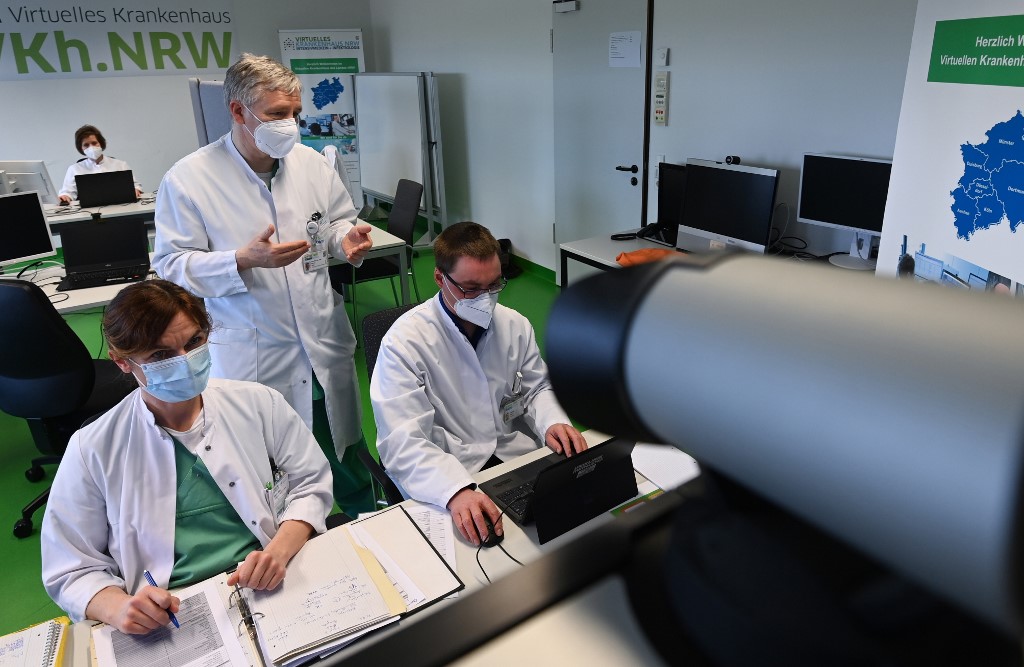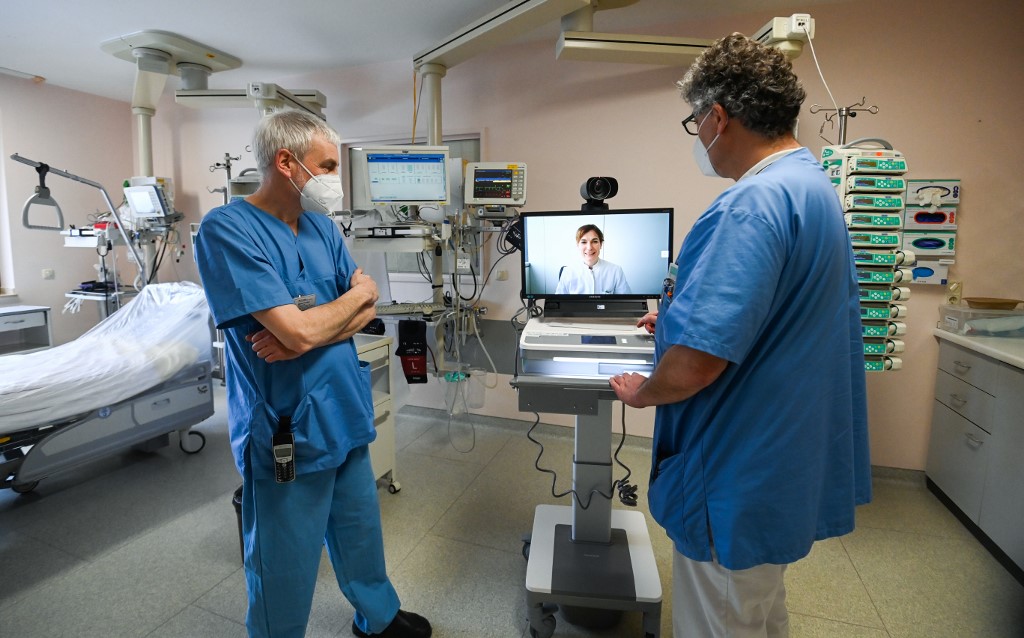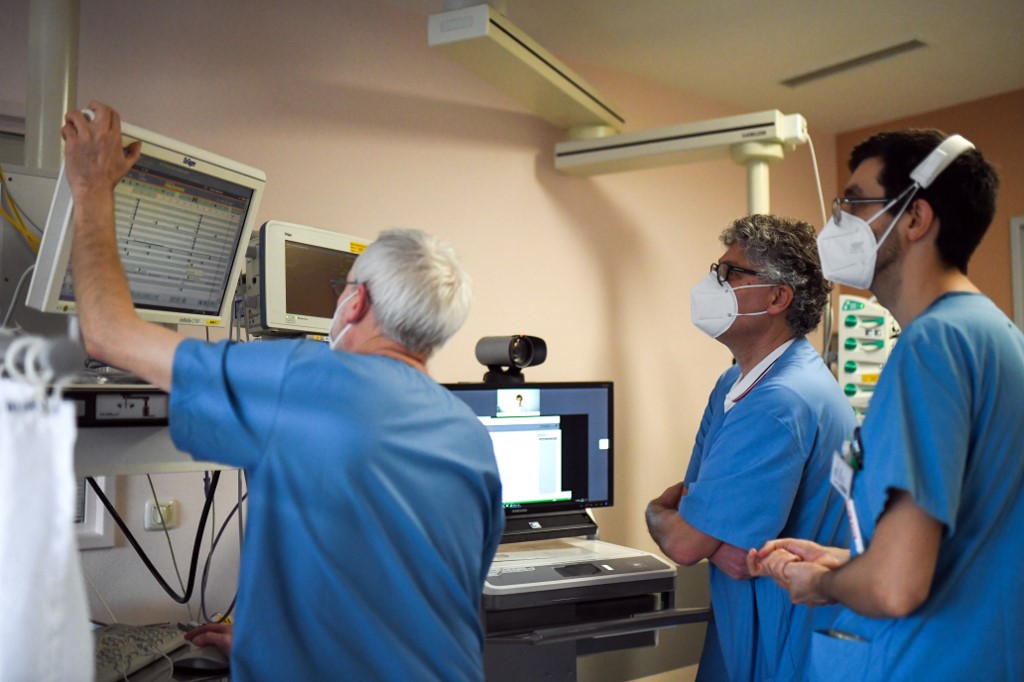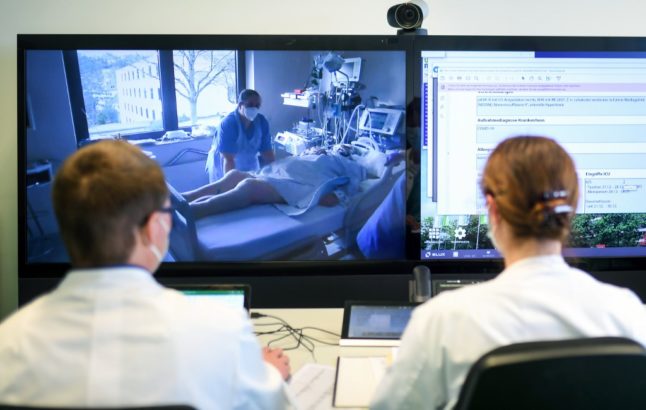These experts are not with him in the intensive care unit, but at a bigger hospital 20 kilometres (12 miles) away, linked up via videoconference as part of a project to connect medics in the state of North Rhine-Westphalia.
The project dubbed the Virtual Hospital has been running since March and aims to help smaller hospitals take in and care for Covid-19 patients, preventing major hospitals from becoming overwhelmed.
So-called telemedicine has become increasingly popular during the pandemic and could also be used in the future to help improve access to specialist care in areas outside of big cities.
“Patients suffering from respiratory failure are normally cases for large, multi-disciplinary and very well-equipped hospitals,” said Gernot Marx, director of the intensive care unit at Aachen University Hospital, one of the centres of expertise for the project.
“Local and regional hospitals would not normally do that,” he told AFP.
Thanks to the virtual consultations, “we can do things that would have absolutely required a transfer before,” said Bootsveld.

Doctor Judith Ibba, Clinic Director of Intesiv Medicine at the University hospital in Aachen Gernot Marx, and Joachim Koeck use telemedicine for the treatment of Covid-19 patients in Aachen. Photo: AFP
Telemedicine has made it possible to “safeguard intensive care capacity” during the pandemic, said project manager Sandra Dohmen.
“So far, 90 percent of our patients have been able to stay in hospitals close to where they live,” she said.
READ ALSO: German Health Minister calls for cautious shutdown exist amid Covid-19 mutation concerns
Virtual advice network
North Rhine-Westphalia had already been connecting 17 local hospitals with the region's two big university hospitals through a virtual advice network since 2012.
But “the coronavirus in March was an opportunity to extend the offer” to all hospitals in the region, Dohmen said.
“There was a great fear that the situation in Germany would be comparable to that in Italy,” Marx said.
Participants in the scheme have so far carried out more than 1,800 videoconferences, helping to treat 300 patients.
A similar EU-backed scheme called ICU4Covid is planned to help doctors monitor some 30,000 patients a year across several countries.
In Stolberg, virtual consultations are carried out with the help of a trolley, equipped with a computer and a camera, that can be wheeled from bed to bed.

Senior consultant Andreas Bootsveld (R) speaks with intensive care physician at the University hospital in Aachen Judith Ibba about a COVID-19 case while using telemedicine at the Bethlehem Hospital in Stolberg. Photo: AFP
But in the interests of speed in the pandemic, doctors can now also request a meeting at the click of a button with just a laptop and a webcam.
Among those joining the virtual meetings has been a pharmacist specialising in intensive care — one of only about 50 such specialists in Germany.
READ ALSO: Can Germany get on board with a 'no Covid' strategy?
'Added value'
“Faced with Covid-19 and the many unknowns, the Virtual Hospital makes it possible to create a network for sharing expertise to help patients on site,” said Dohmen, who sees it as “great added value”.
This virtual link has also helped reassure relatives who may have been worried about their loved ones not being treated in a university hospital.
And it can be reassuring for the staff, too, “when they confirm that we have thought of everything” –although “it has to remain a consultation, it must not become remote treatment”, Bootsfeld said.
“It clearly doesn't mean that we were doing a bad job before,” but “we have access to specialist knowledge that we would not normally have in a local hospital,” said the doctor.

Senior consultant Andreas Bootsveld and colleagues attend a video conference with the University hospital in Aachen about a COVID-19 case while using telemedicine at the Bethlehem Hospital in Stolberg. Photo: AFP
But some things have not changed in a country famously lagging behind in the digital revolution: participants of a meeting still have to take notes by hand, and lists of medicines are sent by fax.
The next step for the project will be to devise ways of transferring health data such as vital signs automatically during the calls.



 Please whitelist us to continue reading.
Please whitelist us to continue reading.
Member comments